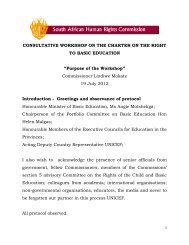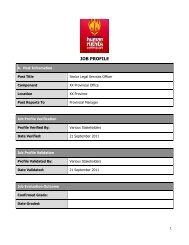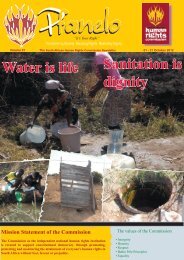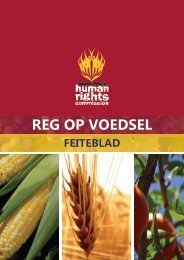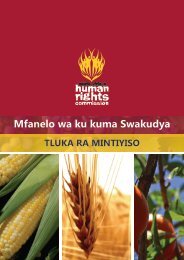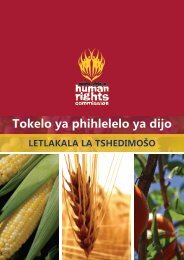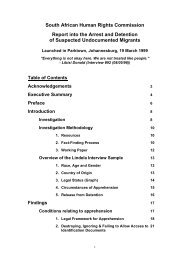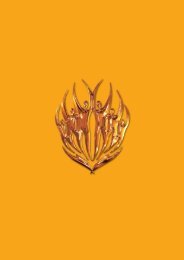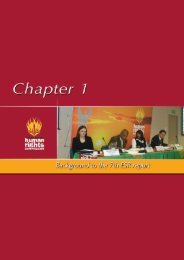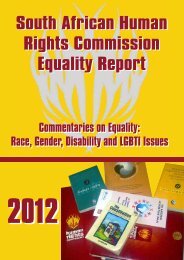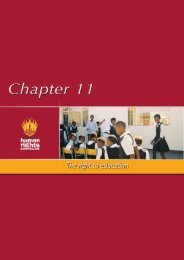HUMAN RIGHTS
Human Rights Development Report - South African Human Rights ...
Human Rights Development Report - South African Human Rights ...
You also want an ePaper? Increase the reach of your titles
YUMPU automatically turns print PDFs into web optimized ePapers that Google loves.
South Africa also ratified the first and second optional protocols on 30 July 2003 and 8 February<br />
2002, respectively. During this period the Committee made its observations and<br />
recommendations and posed questions to the government. South Africa responded to these<br />
questions in its Supplement to the Initial Country Report, which is a follow-up to the Initial Country<br />
Report of January 2000. 72<br />
South Africa’s second country report was due in the year 2002 and the third country report was<br />
due in the year 2007. At the end of 2007, both reports were still outstanding. Despite indications<br />
that the second country report would be submitted during 2007, this did not occur. South Africa<br />
has also not complied with its Optional Protocol reporting requirements.<br />
During 2007, there were several significant legislative developments in South Africa regarding<br />
children’s rights. The Sexual Offences Act 73 redefines sexual crimes against adults and children<br />
and creates a range of new sexual offences against children in the areas of exploitation,<br />
trafficking, and child pornography. There are concerns that the Act does not go far enough in<br />
protecting child witnesses in sexual offence cases. 74<br />
The Children’s Amendment Bill made its way through Parliament during the course of 2007. The<br />
Bill addresses the right to family or appropriate alternative care; social services; and protection<br />
from abuse or maltreatment. The National Assembly passed the Children’s Amendment Bill on 6<br />
November 2007. However, moments prior to passing the Bill, the Assembly removed a prohibition<br />
on the use of corporal punishment in the home, purportedly for technical reasons. The Bill is yet<br />
to be finalised by the Parliament’s Second House, the National Council of Provinces (NCOP). The<br />
Commission has been very active in its support for a total ban on corporal punishment. 75<br />
In late December 2007 the long awaited Child Justice Bill was returned to Parliament, and it is<br />
anticipated that it will be processed during 2008. The Bill focuses on restorative justice, keeping<br />
young offenders out of prisons, integration of young offenders into families and communities, and<br />
diversion. The Bill is important considering the ongoing concerns for the high numbers of children<br />
in prisons. 76<br />
During 2007, the Department of Social Development worked on developing a yet to-be-finalised<br />
strategic framework for children with disabilities. Also, the National Task Team on Child Abuse<br />
and Neglect is in the process of developing a strategy document. The Commission is involved in<br />
both of these processes.<br />
72 See “Implementation of the Convention on the Rights of the Child” at<br />
http://www.children.gov.za/Publications/policies3.htm.<br />
73 Sexual Offences Act [Act 32 of 2007], available online at<br />
http://www.southafrica.info/public_services/citizens/your_rights/sexual-offences-bill3.htm<br />
74 Lee Rondganger, Tough new sex law means no more teen kisses, Cape Times, p. 1, 17 Dec. 2007.<br />
75 http://www.sahrc.org.za/sahrc_cms/publish/article_283.shtml<br />
76 http:/fs/www.childlinesa.org.za/ChildrensRights.htm<br />
21<br />
21



